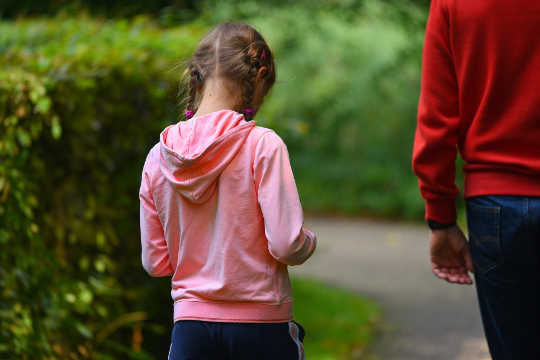
Image by Mabel Amber
Fathers often feel uncomfortable discussing body image and health with their daughters, a study indicates.
Though she is the Director of the Center for Body Image Research at the University of Missouri, even Virginia Ramseyer Winter still often worries if her family is doing everything they can to make sure her daughter has a positive relationship with her body.
“I have a daughter that falls in this age range, between 5 and 10, so certainly it’s something that I’m always navigating at home, and my spouse—her dad—is also navigating,” Ramseyer Winter says. “You know, I work in this field and it’s still really tricky. How do you talk about food in a way that helps kids develop a healthy relationship with it and prevent eating disorders, and focus on their character as opposed to the way they look?”
Most research about parents and their children’s body image focuses on mothers, not fathers. So, in a recent study, Ramseyer Winter, in collaboration with Jaclyn Siegel at Western University and Mackenzie Cook at the University of Missouri, analyzed fathers’ strengths and barriers when it comes to communicating with their young daughters about their body image.
The researchers found through interviews that fathers tend to understand the importance of a healthy self-body image among their children.
“Unsurprisingly, all of the dads we talked to really are interested in addressing this with their daughters. They know it’s important and they place a lot of value on it,” Ramseyer Winter says. “However, we found that there are some common barriers. They are struggling to have these conversations, and many of them are conflating health with body size.”
The 30 fathers interviewed identified several common barriers when attempting to discuss bodily health with their daughters, including a lack of confidence in uncomfortable conversations, gender differences with their daughters, and a recognition of their daughter’s discomfort with discussing their bodies. The study also found that the fathers noticed that their daughters can take negative statements about their own bodies and positive statements about other people’s bodies to heart.
There has been little prior research stating that fathers can have a positive impact on their daughter’s self-body image. In this study, researchers found the fathers attempted to have positive impacts by praising their daughters’ skills, strengths, and talents instead of their body and accepting the way their daughters choose to present themselves. Ramseyer Winter says that understanding these conversations can help fathers learn what resources may be necessary to prevent some of the issues that can cause negative perceptions of body image at a young age.
“Dads obviously influence their children, so we need to understand what fathers are doing, and what is and isn’t working. There wasn’t much discussion on that topic before this study,” Ramseyer Winter says. “My hope is that this research can help to ultimately develop interventions that are easily accessible for fathers and their children to positively impact body image development. If we can prevent negative body image perceptions early on in children’s life, we can impact health and mental health outcomes long-term.”
Ramseyer Winter also says that if parents are looking for advice on how to help their children grow with a healthy perception of their body, there are currently a few resources they can utilize, including books on intuitive eating and Health at Every Size.
About the Authors
The study appears in the journal Body Image.
Source: University of Missouri

Related Books:
Here are 5 non-fiction books on parenting that are currently Best Sellers on Amazon.com:The Whole-Brain Child: 12 Revolutionary Strategies to Nurture Your Child's Developing Mind
by Daniel J. Siegel and Tina Payne Bryson
This book provides practical strategies for parents to help their children develop emotional intelligence, self-regulation, and resilience using insights from neuroscience.
Click for more info or to order
No-Drama Discipline: The Whole-Brain Way to Calm the Chaos and Nurture Your Child's Developing Mind
by Daniel J. Siegel and Tina Payne Bryson
The authors of The Whole-Brain Child offer guidance for parents to discipline their children in a way that promotes emotional regulation, problem-solving, and empathy.
Click for more info or to order
How to Talk So Kids Will Listen & Listen So Kids Will Talk
by Adele Faber and Elaine Mazlish
This classic book provides practical communication techniques for parents to connect with their children and foster cooperation and respect.
Click for more info or to order
The Montessori Toddler: A Parent's Guide to Raising a Curious and Responsible Human Being
by Simone Davies
This guide offers insights and strategies for parents to implement Montessori principles at home and foster their toddler's natural curiosity, independence, and love of learning.
Click for more info or to order
Peaceful Parent, Happy Kids: How to Stop Yelling and Start Connecting
by Dr. Laura Markham
This book offers practical guidance for parents to shift their mindset and communication style to foster connection, empathy, and cooperation with their children.
























